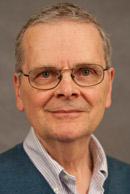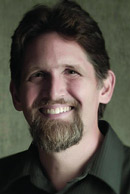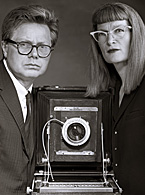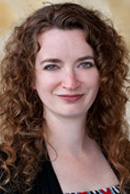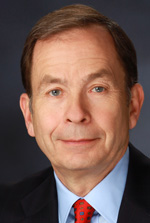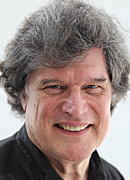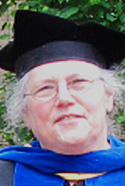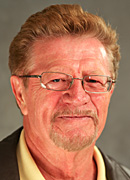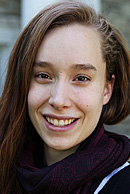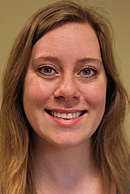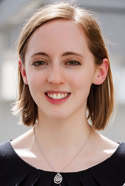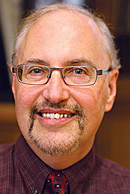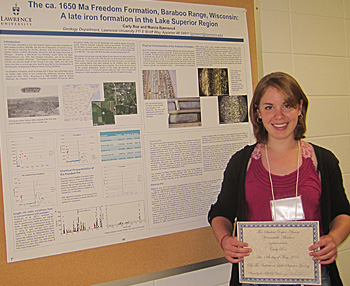A tragic accident didn’t derail David Gray’s career. It redirected it.
The 1966 Lawrence University graduate will be recognized by his alma mater with the college’s Lucia Russell Briggs Distinguished Achievement Award Saturday, June 16 as part of the annual Reunion Weekend celebration.
Gray, of St. Louis, Mo., will be one of eight alumni honored for career achievements, contributions to the betterment of society or volunteer service to Lawrence at the annual Reunion Convocation at 10:30 a.m. in the Lawrence Memorial Chapel. The event is free and open to the public.
Nearly 800 alumni and guests from 41 states and seven countries, including Romania, Singapore and Spain, are expected to participate in the festivities.
This year’s reunion unofficially opens Thursday with a special series of panel presentations and small-group discussions organized by members of the new Lawrence 50-Year Connection, a cohort of alumni who have graduated 50 or more years ago. Scheduled topics include “College Experiences That Mattered Later On,” “Picking Myself Up and Getting Back in the Race” and “Words of Wisdom.”
Lucia Russell Briggs Distinguished Achievement Award
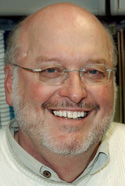
At the age of 32, and shortly after completing his graduate studies, Gray fell from the roof of his home, leaving him paralyzed from the neck down. Undeterred, Gray put his Ph.D. in psychology and genetics to work as a researcher, advocate and spokesperson for those with disabilities.
After a long career with the National Institutes of Health and U.S. Department of Education, Gray joined the Washington University School of Medicine as a professor of occupational therapy and neurology. He has collaborated regularly with the World Health Organization, U.S. Department of Health and Human Services and National Institute of Child Health and Human Development, helping to pass disability related laws, secure grants and bring about a greater understanding of disability issues to policy makers.
Most recently, Gray has been working with the country’s leading engineering schools and their students to design and produce more advanced equipment for those living with disabilities.
Alice Peacock, Nashville, Tenn., and Marcia Mentkowski, Milwaukee, will join Gray as recipients of the Briggs Distinguished Achievement Award. Named in honor of the second president of Milwaukee-Downer College, the award recognizes alumni of more than 15 years for outstanding contributions to, and achievements in, a career field.
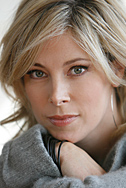
A singer, songwriter and literacy activist, Peacock is living the dream of a professional independent musician. Since her debut album, “Real Day” in 1999, the 1992 Lawrence graduate has released three more albums: the self-titled “Alice Peacock;” “Who I Am” in 2006; and “Love Remains” in 2009. She has recorded with such notable artists as Bob Dylan, John Mayer and John Mellencamp while performing around the country.
Inspired by one of her own songs about individuals taking action to make a difference — “I’ll Start With Me” — Peacock partnered in 2003 with Hugh Haller, president of the Camping and Education Foundation and photographer Paul Natkin to create Rock for Reading. The nonprofit organization leverages the power of music to inspire literacy, motivating and empowering people to enrich their lives through reading.
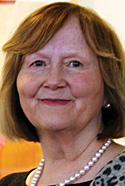
Mentkowski, a 1961 Milwaukee-Downer College graduate, enjoyed a distinguished career in higher education. After completing a Ph.D. in educational psychology from the University of Wisconsin-Madison, Mentkowski embarked on a career that included appointments at Harvard University and the University of Toledo.
A renowned expert in the field of educational evaluation, Mentkowski joined Alverno College in 1976, where she helped the institution refine its unique educational approach, one that employs alternative assessment techniques rather than standard letter grades. During her more than 30 years at Alverno, Mentkowski published extensively, served in leadership positions in a number of national professional organizations, including the American Psychological Association, and served in consulting roles for numerous colleges, universities and governmental bodies.
George B. Walter Service to Society Award
Robert VanDale, New Wilmington, Pa., a 1957 Lawrence graduate, will receive the George B. Walter Service to Society Award. Named in honor of Walter, ’36, beloved former faculty member and dean of men at Lawrence, who believed strongly that every individual can and should make a positive difference in the world, the award recognizes alumni who best exemplify the ideals of a liberal education through socially useful service in their community, the nation or the world.
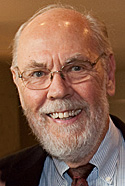
Professor emeritus at Pennsylvania’s Westminster College, where he spent 25 years as director of the Peace and Conflict Resolution Center, VanDale devoted his long career, both inside and outside the classroom, to national and international ecumenical and interfaith dialogues. During a sabbatical in the late 1990s, he conducted taped interviews with 100 “peacemakers” throughout the United States.
In addition to teaching and curriculum development, VanDale traveled the world — Egypt, Ethiopia, Israel, Kenya, Mexico, Northern Ireland, among others — working on a variety of reconciliation and peacemaking efforts. After the 9/11 terrorist attacks, VanDale turned his attention to bridging the divide between the Muslim and Christian communities, leading international teams in an interfaith cooperative movement. A member of several national and international boards, VanDale, in retirement, remains involved in peace and justice issues, including projects affiliated with Habitat for Humanity and the Presbyterian Disaster Assistance program.
Gertrude Breithaupt Jupp Outstanding Service Award
George Chandler, Durham, N.C., Hugh Denison, Milwaukee, and Marian “Kirk” Kirkpatrick Torian, Mequon, will receive the Gertrude Breithaupt Jupp Outstanding Service Award in recognition of their extensive volunteer efforts on behalf of Lawrence.
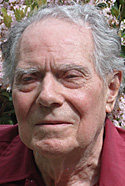
A 1951 graduate, Chandler has contributed time, talent and treasure to his alma mater, most notably through the George and Marjorie Olsen Chandler Professorship in Music he and his late wife, Marjorie Olsen Chandler ’44, established in 2003. The professorship reflects the Chandler’s deep appreciation for their Lawrence educations, their love of music and their conviction of the importance of music and arts participation in a liberal arts education.
Chandler has served as a class agent since 2008 and as a committee member for his 50thand 60th reunions. He assisted with the plan for the public phase of Lawrence’s More Light! campaign as a member of the Alumni Advisory Committee and provided gifts and loans of artwork in 2011 to celebrate the successful conclusion of the campaign, as part of the “Lawrence Collects” exhibition.
Denison, a 1968 graduate who left a successful investing career with Heartland Funds at the age of 50 for eight years to focus on teaching Milwaukee inner-city youth, has spent the past six years as co-chair of the Legacy Circle National Council, promoting Lawrence’s planned giving program at events and through personal testimonials.
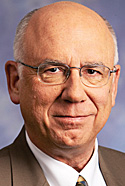
He helped lay the groundwork for the successful More Light! campaign by hosting a focus group and educating key volunteers and potential donors about it. As a member of the Lawrence University Board of Trustees’ development committee and capital campaign committee, Denison has been instrumental in the college’s fundraising efforts, crossing the country to develop strong relationships with alumni and supporters of the college and encouraging donors to realize their full philanthropic potential.
Denison has served as an admissions volunteer, was a member of the gift committee for his 40th reunion and has shared his investment expertise with students through the Lawrence Scholars in Business program.
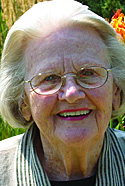
Torian, a 1944 Milwaukee-Downer graduate, spent more than 30 years as a class agent, endearing herself to classmates by including an appropriate cartoon from The New Yorker with her letters. A member of the Lawrence University Alumni Association board from 1995-1999, she also served on committees for her 50th and 60th reunions. She is a former co-chair of the Lawrence-Downer Legacy Circle and presently serves on the Legacy Circle National Council.
Presidential Award
Richard Boya, New Berlin, will receive the Presidential Award, which recognizes exemplary leadership and notable actions that have contributed to the betterment of the entire Lawrence community.
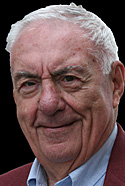
A 1952 graduate, Boya was instrumental in the creation of the Lawrence development office in the early 1960s, serving as the college’s first vice president for development and external affairs. In the role, he launched Lawrence’s planned giving program and established the Founders Club. Over the years, he has shared his expertise about best practices in fundraising with many Lawrence staff members.
A former admissions volunteer and class agent, Boya has served on various committees for his 40th, 5othand 60thclass reunions.
About Lawrence University
Founded in 1847, Lawrence University uniquely integrates a college of liberal arts and sciences with a world-class conservatory of music, both devoted exclusively to undergraduate education. Ranked among America’s best colleges by Forbes, it was selected for inclusion in the book “Colleges That Change Lives: 40 Schools That Will Change the Way You Think About College.” Individualized learning, the development of multiple interests and community engagement are central to the Lawrence experience. Lawrence draws its 1,445 students from 44 states and 35 countries. Follow Lawrence on Facebook.
